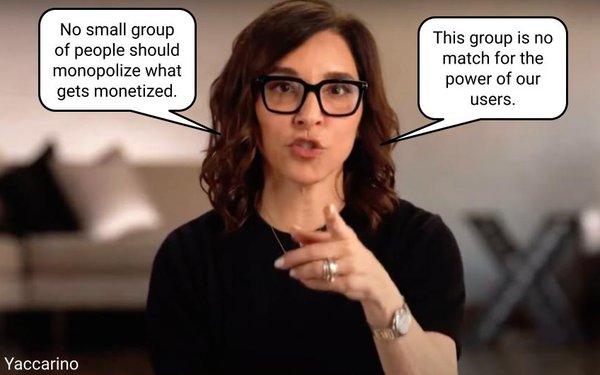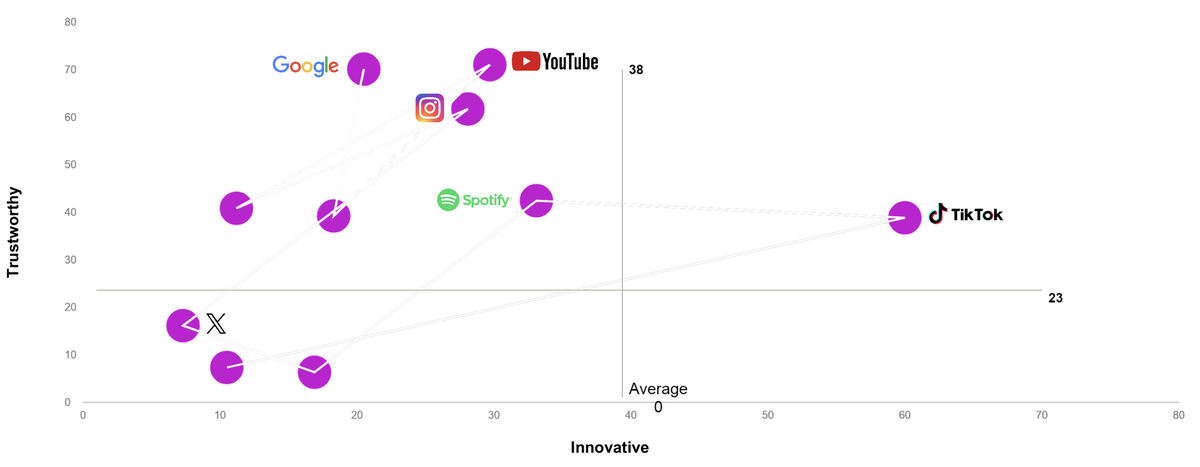
Well, Linda Yaccarino was right, the Global
Alliance for Responsible Media (GARM) was no match for the power of X.
In a statement confirming its decision to shutter GARM early this morning, the World Federation of Advertisers
acknowledged as much, noting that GARM "is a small, not-for-profit initiative."
The statement goes on to note that recent allegations made by X Corp., the Republican majority controlling the
House Judiciary Committee and others misconstrued GARM's purpose and activities.
As a journalist who has covered the advertising business for nearly half a century, I've never been prouder of
the industry's efforts to self-regulate how it leverages the immense power of its advertising dollars to help make the world a better place.
Not just GARM, or the WFA in general, but similar
initiatives by the Association of National Advertisers, the American Association of Advertising Agencies, Ad Net Zero, the Institute for Advertising Ethics (IAE), individual brand marketers and
agencies, independent data, tech and analysis providers like NewsGuard over the past several years to redirect ad spending in a way that supports society, rather than harming it.
advertisement
advertisement
Speaking as
the editor of a trade publication produced by a small group of people, I would say the efforts embodied by GARM and those others is long overdue, because for the past quarter century the ad industry
has been the economic engine giving power to unregulated platforms like X Corp. (formerly Twitter), and others to cause social harm.
And the recent actions of X Corp., including utilizing its
economic might to undermine a voluntary industry initiative to think about and act on the consequences of where advertisers place their ad dollars, only underscores that.
It isn't just ironic
that X Corp. utilized an antitrust suit to undermine voluntary self-regulation, or that it cited the First Amendment rights to derail the commercial free speech of advertisers to decide what media
media they want to show up in. It's a visceral example of the unchecked power digital media can have when it is owned and controlled by a small group of people with immense wealth.
And I don't
just mean Elon Musk, but other billionaires who are utilizing their wealth to weaponize media for their own political ends, including disrupting the status quo of democracy, social norms, health and
well-being.
The truth is that GARM was small.
According to the WFA's 2023 annual report, GARM-related revenue accounted
for about 10% of its roughly $11 million balance sheet.
Another truth is that GARM likely had only a modest effect on the decisions of big advertisers to redirect their ad dollars from X's
platform to other more savory and brand-safe places.
According to a survey of global marketers conducted by Kantar last year, X ranked as the least trustworthy and least innovative of the
major digital media platforms. It also ranked the worst in terms of platforms that individual brand marketers planned to buy advertising on last year or this year.
Kantar has just completed a
2024 update of those surveys and plans to release them soon, but a number of other digital ad-spending sources have already shown the migration of ad dollars away from X, as has X's own statements
over the past couple of years that Elon Musk has owned it.
And X's finger-pointing, scapegoating antitrust suit against GARM only underscores its desperation, albeit a retrospectively
successful one.

I don't fault the
WFA's decision to shutter GARM. It is a small organization and has other important industry roles to play, but the fact that it knuckled under creates a dangerous precedent for the ad industry, and
its ability to organize and self-regulate itself.
I mean, what's next? Will the fossil fuel industry sue the IAE for its greenwashing prevention initiatives?
Will they sue Ad Net
Zero, or the WFA for supporting it?
Will the Heritage Foundation or some other right-wing extremist group sue the Association of National Advertisers, or its "Brands For Humanity" initiatives,
including the Alliance for Inclusive and Multicultural Marketing (AIMM), SeeHer, etc. for promoting diversity, equity and inclusion in the ad industry, as well as in its media supply chain?
X
v. GARM was not the first time I've covered big, powerful entities threatening or taking antitrust action against the ad industry trying to do something better for society.
Because it does
represent so much economic power, the ad industry -- especially its trade associations -- always are under scrutiny.
But the right path is to organize and promote voluntary, self-regulatory
change, not industry mandates. That's what the ANA does. It's what the IAE does. It's what the WFA does. It is what GARM did.
Back in the 1990s, when the ad industry was exploring the
development of a JIC -- a joint industry committee representing all sides (advertisers, agencies and media suppliers) -- to design and create a better way of measuring media audiences, Nielsen
threatened an antitrust suit and the Advertising Research Foundation backed down.
I point that one out, because decades later, a supply-side initiative -- TV networks-owned OpenAP -- launched
its own JIC, and bastardized the meaning of what an actual JIC should mean in the U.S.
The point isn't what the right thing to do is. Or even what the legal thing is. It's that economic might
increasingly decides what is right in the media industry, and not as X CEO Linda Yaccarino suggests, the power of individual platform users.
The last sad truth about the demise of GARM is that
it probably had only a marginal impact on X Corp.'s "monetization."
Remember the last time big global advertisers took action against a big digital platform and organized a boycott against Facebook in 2020 in an effort to influence the platform's brand and public safety
policies? Remember what happened? Facebook's revenues went up, not down. The reason for that is that the kind of big global brands that participated in GARM are only a fraction of Facebook's and/or
parent Meta's revenue.
The vast majority of ad spending on digital media platforms isn't the Fortune 500, it's the long tail (small and medium-sized businesses, not giant brands).
The
truth is that X simply has either done a lousy job of cultivating that marketplace, or small and medium-sized businesses also are pulling back, or pulling out of X's platform.
Of course, we
really don't know because since Musk took it private, we have no publicly reported data from the company to determine that.
What we do know is that since Musk took control of Twitter, and
since he installed Yaccarino as CEO, its reported revenues have floundered, and it has attempted to develop alternative new revenue streams in its pursuit of becoming the "everything app."
None of them seem to have worked. Remember, Musk's big push to convince users to pay for his blue "verified" account labels? How did that work out?
Perhaps the most ironic move of all was
X's other announcement Thursday that it was removing all ads for its "Premium+"
subscribers.